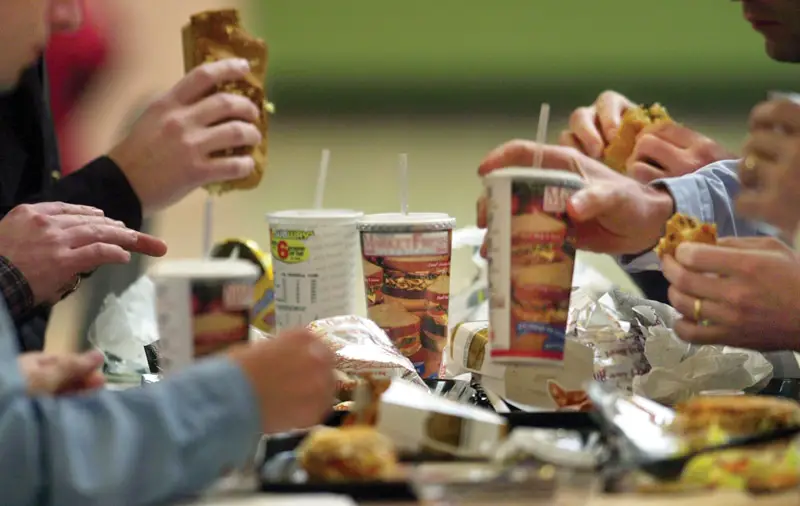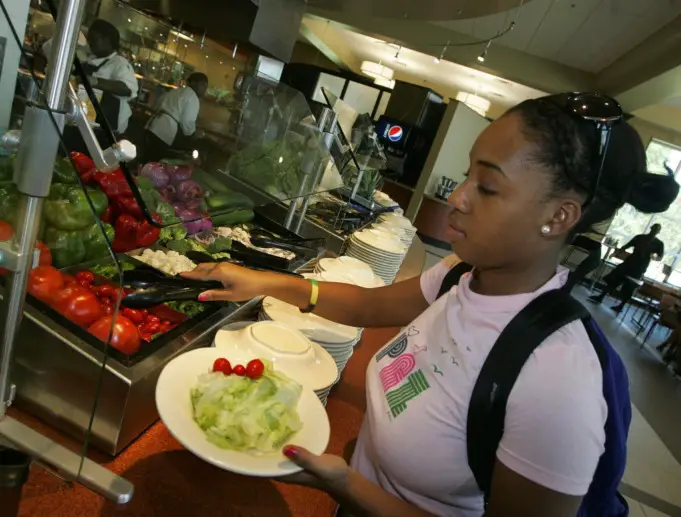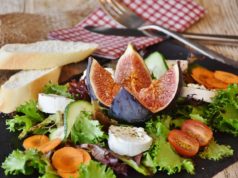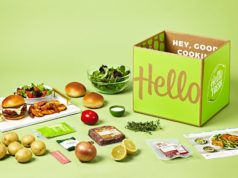Eating well can be a real challenge in college. Considering the workload, lifestyle, and budget of typical students, it’s no wonder that college isn’t exactly the best place to implement healthy eating habits. Lack of cooking tools or proper kitchen appliances is one among the many issues students face on their quest for healthy eating.
Here are 7 tips to help you eat healthy in college, and feel more energetic and ready to tackle other college challenges.

Have a good breakfast:
Skipping breakfast is bad for you. How are you supposed to pay attention to the professor when your brain is screaming for calories? To put it simply, having an insufficient breakfast or eating nothing in the morning has a negative impact on scholastic achievement.
Even if you’ve got no time to actually sit down and enjoy your morning meal, you can easily grab some fruit and a bagel. Store these items in your residence hall room, and you’ll be ready every morning for the day’s challenges.
Limit your sugar intake:
Sugar provides calories, but it doesn’t contain almost any nutrients. That’s why sugary snacks are called empty calories – they’ll keep you full for an hour, but then you’re bound to feel even hungrier.
Moreover, sugar contributes to tooth decay. That’s why it’s best to start cutting down sugar from your diet. If you like to sweeten your coffee, tea, cereal, or fruit, you can simply use honey – it’s sweet and delicious!
Check out the salad bar:
The dining hall salad bar is tricky territory. Just because you picked your meal there doesn’t automatically mean that it is healthy.
When choosing ingredients for your meal, go for leafy greens, raw vegetables, and fresh fruit.
Avoid creamy dressings or bacon bits. Mayonnaise-based salads are off the table as well. All these are full of calories and fat – sometimes even more than a burger with fries!
Drink responsibly:
If you drink alcohol, remember that it’s full of calories that don’t offer any nutritional value. But this is just one reason to limit your consumption of alcohol.
Alcohol acts similar to poison in your body. If you drink in excess, you might develop health problems – for example, your liver might be easily hurt in the process.
Instead of a light beer or a glass of wine, accompany your meals with water. You need at least eight glasses of water a day. If you exercise, you may need more. Carry a bottle of water along to class and sip from it regularly to keep yourself hydrated.
Eat foods that are rich in calcium:
When in your early twenties, you’re building up stores of calcium in your body. If you follow the right diet, you won’t suffer from osteoporosis later in life.
Make sure to eat plenty of yogurt, cheese, and other dairy products. Remember that green leafy vegetables are full of calcium as well!
Invest in healthy snacks:
During a late night study session, you’re likely to be tempted by the vending machine and its store of candy, ice cream, or savory snacks. These are full of sugar, fat, and salt. They won’t help you focus on your studies.
Instead, go for fresh or dried fruit, unbuttered popcorn, nuts, whole wheat crackers or rice cakes. If you’ve got a fridge at your disposal, combine raw vegetables with some cottage cheese dip for the ultimate study session snack.
If fast food is inevitable, choose wisely:
Sometimes there’s just no way to avoid fast food. Going out with friends, dating, or leading a very busy lifestyle all direct you down the fast food lane.
The trick is to choose well once you find yourself surrounded by fast food options. Pick pizza with half the cheese or a green salad with reduced calorie dressing. Limit high fat dishes like fried chicken, fish sticks, or French fries (a baked potato is an excellent alternative!).
Key takeaway
Remember that everyone has different needs when it comes to nutrition.
If you notice that you feel more tired and less energetic than usual, the problem might lie with your diet. Consult with a doctor or nutritionist to develop a diet plan that matches your individual needs and health requirements.
Author Bio:
 With a background in business administration and management, Tess Pajaron currently works at Open Colleges, Australia’s leading online educator. She likes to cover stories in careers and self-improvement.
With a background in business administration and management, Tess Pajaron currently works at Open Colleges, Australia’s leading online educator. She likes to cover stories in careers and self-improvement.












